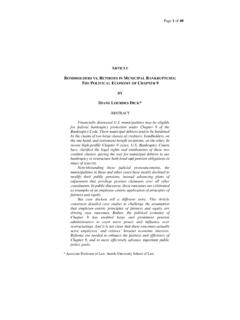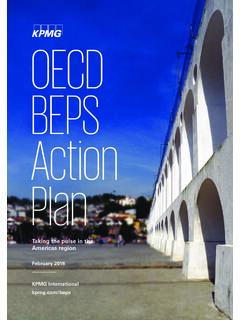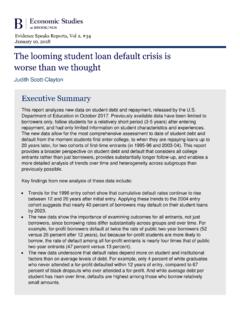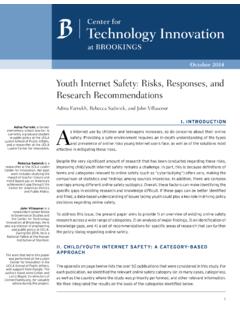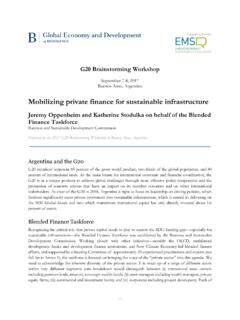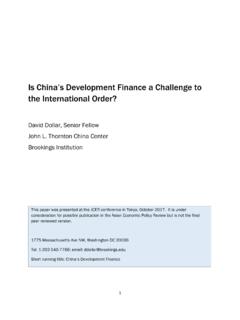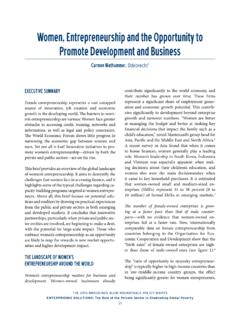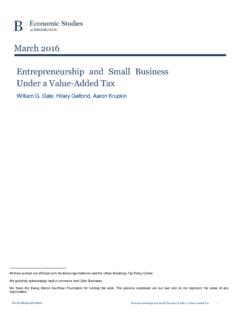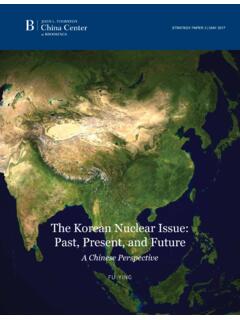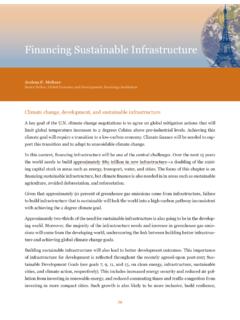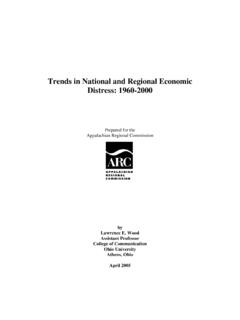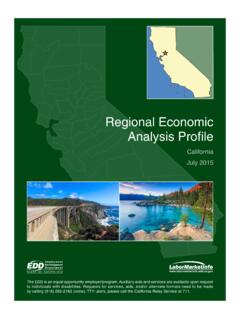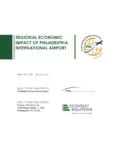Transcription of The Experience with Regional Economic Cooperation ...
1 THE Experience with Regional Economic Cooperation ORGANIZATIONSLESSONS FOR CENTRAL ASIAJ ohannes F. LinnOksana PidufalaWOLFENSOHN CENTER FOR DEVELOPMENTWORKING PAPER 4 | OCTOBER 2008 The Brookings Global Economy and Development working paper series also includes the following titles: Wolfensohn Center for Development Working Papers Middle East Youth Initiative Working Papers Global Health Financing Initiative Working PapersLearn more at Authors Note:We are grateful to Homi Kharas, Juan Miranda and Robert Siy, to David Kruger, Craig Steffensen and colleagues in the CAREC Unit of the Asian Development Bank, as well as to Satish Rao and his colleagues of the Operations Evaluation Department of the Asian Development Bank for their many insights.
2 We also benefi ted from the com-ments of the participants of the CAREC Senior Offi cials Meeting in Manila in September 2007 and to participants of a seminar at the Asian Development Bank in July 2008, to whom we presented some early fi ndings of our research. We also wish to acknowledge the fi nancial support of the Asian Development Bank and of the Wolfensohn Center for Development. All errors remain F. Linn is the Executive Director of the Wolfensohn Center for Development in the Global Economy and Development Program at the Brookings Institution. He was the World Bank s Vice President for Europe and Central Asia from 1996 to 2003 and cur-rently serves as CAREC Special Adviser.
3 Oksana Pidufala was a Senior Research Assistant with the Wolfensohn Center for Development in the Global Economy and Development Program at the Brookings Institution. CONTENTSA bstract ..1 Introduction .. 2 Why Do Regional Organizations Matter? .. 4A Typology of Regional Organizations .. 6 Key characteristics of Central Asian Regional organizations .. 6 Key characteristics of Regional organizations from Asia, Europe and Latin America .. 9 Performance of Regional organizations in Central Asia .. 12 Performance of Regional organizations in the rest of the world .. 13 Lessons from International Experience on Regional Economic Cooperation for Central Asia.
4 18 Lesson 1 .. 18 Lesson 2 .. 18 Lesson 3 .. 19 Lesson 4 .. 19 Lesson 5 .. 19 Lesson 6 .. 20 Lesson 7 .. 20 Lesson 8 .. 20 Lesson 9 .. 21 Implications for CAREC .. 22 References .. 23 Annex: References for Specifi c Organizations .. 24 Endnotes .. 28 THE Experience with Regional Economic Cooperation ORGANIZATIONS 1 THE Experience with Regional Economic Cooperation ORGANIZATIONSLESSONS FOR CENTRAL ASIAJ ohannes F. LinnOksana PidufalaABSTRACTS ince the collapse of the Soviet Union, Central Asia has witnessed repeated efforts to strengthen Regional integration through Cooperation with the establishment of a number of Regional or-ganizations with Central Asian participation.
5 In this paper, we review the Experience with Regional coop-eration initiatives and organizations in Central Asia and the rest of the world. Using a typology of Regional organizations that we have developed for this paper, we review the functions and performance of selected Regional organizations and compile evidence more generally on the Experience with Regional Cooperation around the globe. Based on this we draw some lessons to help Central Asian countries, their partners and their Regional organizations respond effectively to the opportunities and challenges of Regional Cooperation and integration. Central Asian countries need to real-ize that effective Cooperation is not easy.
6 It takes time and requires a fl exible, constructive approach of all major partners. It also requires effective leadership by key countries, institutions and individuals and a careful selectivity for membership and for the man-date of the organization . Where multiple Regional or-ganizations overlap in membership and mandate, it is essential to address the risk of costly duplication. The paper concludes with an assessment of the specifi c implications for the Central Asia Regional Economic Cooperation Program (CAREC).2 WOLFENSOHN CENTER FOR DEVELOPMENTINTRODUCTIONR egional Cooperation has long been seen as an instrument for promoting Economic growth and political stability around the globe.
7 The suc-cessful integration of Europe under the umbrella of the European Union after centuries of wars on the European continent has been a great beacon of hope for many developing countries and regions that have sought to avoid Regional confl ict and to exploit the opportunities to create prosperity through Regional Cooperation and Economic In the early decades after World War II much of the Regional Cooperation among developing countries was driven either by efforts to protect Regional markets from international competition in Latin America or by the need to grapple with the fall-out of decoloni-zation, which led to the disintegration of integrated colonial Economic regions, especially in Africa.
8 In re-cent decades, in contrast, Regional Cooperation efforts have more commonly followed the premise of new regionalism, which postulates that Regional coop-eration should be designed to help countries not only integrate with each other, but also with the rest of the world. The difference between old and new Regional -ism is well captured by Devlin and Castro (2004, 43): The policy framework encompassing the old region-alism of the postwar period in developing countries involved an inward-looking, protectionist, state-led im-port substitution strategy, often by authoritarian re-gimes. In contrast, the New Regionalism occurs within a framework of policy reform that promotes open and competitive market-based economies in a modern, democratic institutional setting.
9 After the collapse of the Soviet Union in 1990, the newly independent republics of the Former Soviet Union faced problems of political and Economic dis-integration on a huge scale. While early efforts were made by the new countries to maintain cooperative arrangements to prevent Economic disintegration, they were not successful most notably was the fail-ure of the Commonwealth of Independent States (CIS) to maintain open borders, trade, transport, and capital mobility at levels comparable to those dur-ing the Soviet Union. Part of the dramatic Economic decline of the Former Soviet Union can be explained by disintegration of the Economic space of the region (Linn 2004).
10 Since then, various efforts have been made in different parts of the Soviet Union to forge improved Economic links through sub- Regional coop-erative arrangements. Among these the most notable for Central Asian countries are the Eurasian Economic Community (EurasEC), the Shanghai Cooperation organization (SCO) and the Central Asian Regional Economic Cooperation Program (CAREC).2 The purpose of this paper is to survey the Experience with Regional organizations in developing countries and to draw lessons that can be helpful for Central Asia, and specifi cally for the participants in CAREC as this Regional organization seeks to move forward with an ambitious agenda for Regional Cooperation and in-tegration in its four core areas: transport, trade, trade facilitation and energy.
